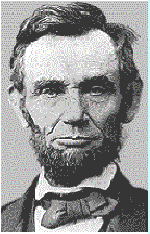|
1861 - 1865
Abraham
Lincoln’s election to the presidency, with slavery and states’ rights as the
major campaign issues, caused South Carolina, on December 20, 1860, to declare, "the
union now existing between South Carolina and other States under the name of the United
States of America is hereby dissolved."
The
War between the States began when the first hostile shot was fired on January 9, 1861, and
ended formally, with the surrender of the South, on April 9, 1865. The combined armies of
both sides lost over 600,000 soldiers, white and black, who died from battle wounds or
disease. The Union and the anti-slavery cause lost one president, Abraham Lincoln, the
emancipator.
At the beginning of the Civil
War, Negroes were not wanted in the battle to save the Union and abolish slavery.
According to the 1898 'Negro in America', "when the question was first broached of
enlisting Negro soldiers there was a very strong prejudice against it among both officers
and men. The general opinion seemed to be that slaves were disqualified for efficient
service as soldiers by reason of their ignorance and the servile spirit begotten by
bondage. They could not be expected to be brave, it was said, especially when brought face
to face with former masters whom they had been taught to respect, reverence and
obey."
Lincoln’s overriding concern at the beginning of the Civil War
was the preservation of the Union. As late as the latter part of 1862 he said, "If
I could save the Union without freeing any slave, I would do it; and if I could save it by
freeing all the slaves I would do it; and if I could save it by freeing some and leaving
others alone, I would also do that."

Abraham Lincoln
His personal conflict, and that of the
nation, in balancing his interpretation of the rational  and irrational elements that
provoked the war and his humanitarianism for those in bondage ceased in 1862 when the
preservation of the Union and the abolishment of slavery became forever inseparable.
During that same year, Lincoln ordered the army to stop returning runaway slaves to
southern territory, basically annulling the Fugitive Slave Laws,
and contravening the Supreme Court’s decision in the Dred Scott case that slaves were
beings without the rights of citizenship and were simply property that must legally be
returned to their owners, without exception. and irrational elements that
provoked the war and his humanitarianism for those in bondage ceased in 1862 when the
preservation of the Union and the abolishment of slavery became forever inseparable.
During that same year, Lincoln ordered the army to stop returning runaway slaves to
southern territory, basically annulling the Fugitive Slave Laws,
and contravening the Supreme Court’s decision in the Dred Scott case that slaves were
beings without the rights of citizenship and were simply property that must legally be
returned to their owners, without exception.
On January 1,
1863, Lincoln reinforced the nation’s resolve to abolish slavery in the states, after
announcing his intentions earlier, by issuing the Emancipation Proclamation. It was one of
America’s greatest documents, conferring freedom on all slaves within the confines of
the areas in rebellion against the United States. With the enactment of the 13th amendment
(in effect 1865) to the U.S. Constitution, slavery came to an end, and would be forever
illegal, in the United States.
Also during 1863, Congress passed the new Militia Act, allowing the
president to use "as many persons of African descent" as needed "for
suppression of the rebellion." It also repealed earlier legislation (1792) than
forbade "persons of color" from serving in the militia. Free blacks and former
slaves could now be recruited, however, their pay was set at $10 per month less
clothing allowance (whites were paid $13 plus clothing allowance), and they were required
to have white officers. All men now had the opportunity to serve their country in its time
of need.
'Black History' segment
written in June, 1998 by David Lodge
[ Back to Black History Index ]
|

